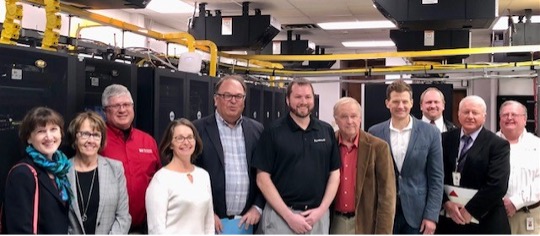4/15/2022 1:19:44 PM

On Wednesday, Department of Employment and Economic Development (DEED) Commissioner Steve Grove and DEED’s Executive Director for the Office of Broadband Development, Angie Dickison, hosted a roundtable discussion at local internet service provider Nuvera in Hutchinson. Their discussion focused on why broadband access is essential and why now is the time to finish the job and provide border-to-border broadband access to all Minnesotans.
“I love hearing from leaders and business owners about what makes Minnesota the best place to live and do business, and today’s conversation reinforced how critical high-speed, high-quality broadband is for schools, businesses, families, and communities,” said Steve Grove, DEED Commissioner. “It’s an equity issue on many levels, and during the past several years of the state’s border-to-border broadband program, we have helped bring reliable broadband to about 93% of Minnesotans. The Walz-Flanagan budget invests $170 million to bring border-to-border broadband access to all Minnesotans. It's time to finish the job.”
Roundtable attendees included:
“This pandemic dropkicked us into 2030. It’s not just broadband that’s changed, but who creates content. Kids are creating content and sending it to their teachers. Businesses were always creating content, but now that content creation has migrated to the home – and this decentralization is creating a fundamental impact that’s changing everything,” said Glenn Zerbe, CEO & President of Nuvera.
“Twenty years ago, when we talked about attracting new businesses and new residents, we talked about good streets, good schools, water, sewer and electric. Well nowadays, you need to have broadband if you want to attract and retain those residents and businesses in your community. And with the tight labor force, having broadband is one way local businesses can stay competitive in being able to allow certain jobs to be done at home,” said Matt Jaunich, City Administrator, City of Hutchinson.
“For years we’ve been advocating for the broadband infrastructure, but the other piece of it is the ability to afford that service and the skills to able to use it – as well as access to the devices,” said Angie Dickison, Executive Director, Office of Broadband Development (DEED). “During the pandemic our team created a digital equity working group with the other state agencies to understand all the programs and services available around digital literacy and access. We hope to hire someone soon that will help create a digital equity plan for the State of Minnesota. We’re excited to continue this work with our office and our provider partners around the state.”
“The pandemic completely changed the way we delivered instruction to our students. We had a lot of students who didn’t have any access, until we gave them mobile hotspots, and those hotspots only go so far. They’re better than nothing, but they’re not as good as broadband,” said Daron VanderHeiden, Superintendent of Hutchinson Public Schools. “Another thing we’ve noticed is that now when students are out, they can join their class virtually or watch a recording of what they missed, so they aren’t a week behind in the work if they’re out sick.”
“From a business standpoint, we do a lot of updating to our website and posting on Facebook – so whether that’s at our nursery or at our tree farm, people want pictures. Before broadband, it took so long for these pictures to load on our website – but now with broadband, we’re able to upload more photos and videos to our website that wouldn’t have been possible before,” said Marie Guggisberg, owner of River Creek Nursery. “From a family standpoint, when you have six children in school who need to access the internet for homework and research, it was frustrating before broadband because it took a long time. So broadband, whether it’s for work or your family, it’s just a huge time saver. Especially in the rural community, to have that access is wonderful.”
Economic Development